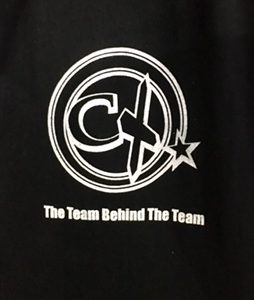The Role of the Cheer Parent
Being a cheer parent can be very overwhelming at times, especially in the first year.
Here are some tips to make your year run a little smoother.
- Arriving to practice on time is important. If practice starts at 6pm, on time is 5:45pm. Those 15 minutes are precious. In that short window your child will need to; change into proper practice attire, lace up cheer shoes (never wear them outside the gym), make a final trip to the bathroom, and make sure their hair is up and out of their face. Being late to get on the floor means missing out on important warm ups and stretches, which prevent injuries. Being on time is critical to make sure your child is prepared properly and gets a good warm up. Unless your child is old enough to drive, you are their transportation and it is your job to make sure they are there on time. On the same token, habitually leaving early is just as detrimental. Leaving early is leaving the squad short a team member and your child is missing out on important class material. Arrange a car pool, or find an alternative if transportation to and from practice is an issue.
- Proper practice attire is a necessity for your child’s safety. For ex: A baggy shirt can cause a stunt to fall by getting caught up in the loose material, or a spotter’s arm to get caught when assisting your child during a tumbling skill. Jewelry can be painfully ripped out if caught on while stunting. Adhere to the dress code rules; they are in place for a reason.
- If you are in doubt about something, ask- don’t assume. Rumors get started quickly in the gym and the best avenue to take is to not partake in it on any level. If you hear something that makes you upset or rubs you the wrong way, ask the director to clarify prior to making a false assumption that may bite you in the butt later.
- Know the proper way to communicate. In most situations it is not a good idea to approach a coach in the gym. Many coaches teach classes back to back and their primary responsibility is to the athletes on the floor. If you pull them away from that, then an athlete could get hurt or a class may not start on time. Depending on your gym policies, a safe and efficient method is by email. This way the coach can address the issue during office time, when they are not instructing a class.
- Yes competition appearance is important. If you are unsure of how to properly do your child’s hair or make-up, ask a veteran parent to give you a crash course prior to the first competition. Showing up with less than perfect hair and make-up with a shrug and ‘I tried’ is unacceptable. Your child spends hours in the gym preparing for competition, so take the time as a parent to prepare them for their moment to shine; make sure they look uniform with the rest of their team.
- Fuel for performance. The last thing you want to send your child to practice with is a soda, sugary sports drink, or even worse- an energy drink. The best drink for hydration is always water. If your child has a double-team practice, camp, or competition, consider packing a snack bag. There may not be healthy options at competitions, so being prepared can ensure that your child will be feeling their very best throughout the day. For more tips on proper nutrition for athletes, check out the free course on NFHS called ‘Sports Nutrition’. See the link at the end of this article.
- Show your spirit. Think your child is the only one who gets to wear a uniform? No way! As a parent you have your own ‘uniform’ for competition day. Some competitions you may wear Spirit Wear sold by your gym (coordinating shirts with your team logo and colors) or if it is a themed competition then you may be asked to wear a crazy costume or clothing to support a specific cause. Sit with other cheer parents from your gym so you can cheer your children on together.
- Help with Team Bonding events. Cheerleading takes place in more than just the gym and competition arena. Stunting and working together as a team takes trust and unity. It is important that the athletes spend some time together outside of the gym just having a good time and getting to know each other.
- Support Fundraisers and/or volunteer with the Parent Booster Club. Cheerleading can be very expensive with the uniforms, tuition, travel expenses, and other associated costs. Help out at fundraising events such as car washes, quarter auctions, bake sales, dances, and more. Not only is it a great way to meet the other cheer parents, but it is an important bonding event for the team and it helps relieve some of the expense.
- Read and stay informed. Read every handout, newsletter, memo and email in it's entirety and ask if you have questions. Many times confusion is caused by simply not reading the information that is given. Input important dates into your phone or on your calendar and set alerts if needed.
- Attend meetings. Parent Meetings are held to discuss issues, provide information, schedule events, and are an overall way to keep involved, be informed, and meet other parents at the gym.
- Join the USASF Parent Action Committee Facebook group. This group is a valuable resource for both new and returning cheer parents. You can freely ask questions and exchange ideas in this supportive positive atmosphere with other cheer parents.
- Last, there is an informative course on NFHS called ‘Positive Sport Parenting’. This course has tons of great information on how to communicate with your child regarding their sport, and how to be a supportive parent. See the link at the end of this article.
Some additional tips
- A parent’s role is to support, encourage and be a role model. A parent should provide unconditional love and support despite the outcome of any practice or competition. Always keep after practice/competition plans, such as going out for dinner, and do not make them contingent on performance. Teach your child about emotional control, how to lose with class, and how to move on from a tough performance. A parent’s behavior plays a critical role in an athlete’s enjoyment of the sport.
- Wins, losses, scholarship opportunities, status and endorsements can cloud judgment and cause a parent to lose perspective. This can ruin the experience for your child and negatively affect the coaches, other team members, parents and officials. Remember – we are working with kids here! The first and primary objective is for them to have FUN.
- Holding investment (time, money, uniforms, travel, etc) over a child’s head causes unnecessary pressure, and can create a desire to please the parent over enjoying the sport for themselves. Your only concern for ‘payback’ should be that your child has fun, learns how to work as a team, gains new skills and improves on current skills, discipline, time management, and learns positive sportsmanship skills. Never make them feel guilty for your sacrifices for them to participate.
- Set academic excellence at a higher priority. Never put practice, training or competitions before education.
- Ask your child what their goals are and align your goals accordingly. Never let your goals supersede your child’s goals. If your child wants to play for fun, then allow them to do so without the pressure of anything further. If they have aspirations for a college scholarship, then support them in working hard to reach that goal.
- All athletes will have a bad practice or a competition where everything goes wrong. Be positive. Your child will already be beating themselves up over it and they need you to be supportive and encouraging, not criticizing them too. Let the coach handle the critiques; you need to play a supportive role as a parent.
- Do not allow sports to be your child’s only identity. Talk to them about other interests, their classes at school, and social events. It is healthy for your child to consider themselves more than athletes. They should see themselves as a good student, family member, and a friend and treat these roles with the importance they deserve.
- Allow the coaches to coach and the athlete’s to learn. Do not coach from the sidelines. It will only confuse and frustrate your child, plus it will affect your child’s teammates and coaching staff in a negative manner. It can undermine the coach and destroy the coach-athlete trust.
Final thoughts
Right now tryouts have concluded, choreography is in full swing, and we are embarking on the start of the new competition season. If you are an experienced cheer parent, consider reaching out to some of the new cheer parents. It can be very intimidating for them to approach you first, so make it a point to introduce yourself and offer to show them the ropes if needed. The first year of cheer is so overwhelming and this kind gesture will not only be appreciated, but it will help the team as a whole to be successful if everyone is prepared.
Have a wonderful 2014-2015 season!
Helpful Links
NFHS Sports Nutrition Free Course
https://nfhslearn.com/courses/55000
NFHS Positive Sport Parenting
https://nfhslearn.com/courses/18000
USASF Parent Action Committee Facebook Group
https://www.facebook.com/groups/usasf.pac/
USASF Cheer Parents 101
http://n1media1.files1.jamspiritsites.com/75189/64572934851102b7806d2f.pdf





